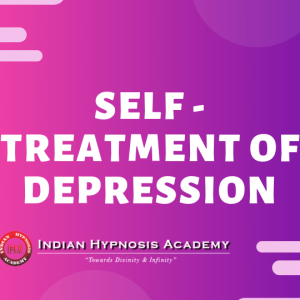Unlock the hidden potential of your mind and explore the fascinating world of hypnosis. Often misunderstood, this powerful technique has been used for centuries to unlock the untapped possibilities within us. From improving physical health to overcoming addictions, hypnosis offers a plethora of healing opportunities that can transform our lives. In this blog post, we will delve into the various ways in which hypnosis can help us achieve our goals, improve our well-being, and harness the incredible power of our minds. So sit back, relax, and prepare to discover the limitless potential that lies within you with this ultimate list of things hypnosis can help with!
Understanding Hypnosis and How it Works
Hypnosis is a state of focused attention and heightened suggestibility, where the conscious mind takes a backseat and the subconscious mind becomes more receptive to suggestions. Contrary to popular belief, it is not about losing control or being under someone else’s power. Instead, it allows us to tap into our own inner resources and make positive changes in our lives.
During hypnosis, a trained professional guides us into a relaxed state through techniques like deep breathing and progressive muscle relaxation. In this deeply relaxed state, our minds become open to suggestion and we can access memories, beliefs, and emotions that may be influencing our thoughts and behaviors.
The subconscious mind plays a crucial role in shaping our habits, fears, desires, and overall perception of reality. By harnessing the power of hypnosis, we can reprogram these underlying patterns to create positive change. It’s like updating the software of your brain!
Common Misconceptions About Hypnosis
When it comes to hypnosis, there are many misconceptions that often cloud people’s understanding of this powerful therapeutic tool. Let’s debunk some common myths and shed light on what hypnosis really is.
One of the biggest misconceptions about hypnosis is that it involves mind control or manipulation. In reality, hypnosis is a state of focused attention where the individual remains fully in control. The hypnotist simply guides them into a relaxed state where they can access their subconscious mind more easily.
Another misconception is that only weak-minded individuals can be hypnotized. This couldn’t be further from the truth! Anyone with an open mind and willingness to participate can experience the benefits of hypnosis. It has nothing to do with intelligence or strength of character.
Some people also believe that under hypnosis, they will lose awareness and memory. While it’s true that individuals may have selective amnesia for certain parts of the session, they are always aware of their surroundings and maintain full memory after coming out of trance.
There’s also a common belief that only certain issues can be addressed through hypnosis, such as smoking cessation or weight loss. However, Hypnotherapy has been proven effective in treating a wide range of conditions including anxiety disorders, phobias, chronic pain management, insomnia, and even irritable bowel syndrome (IBS).
It’s important to understand these misconceptions so you can make informed decisions about whether or not to explore the healing possibilities offered by hypnotherapy. Remember: your mind holds immense power for transformation and growth – embrace its potential!
Physical Health Benefits of Hypnosis
- Pain Management: Hypnosis has shown promising results in reducing pain, both acute and chronic. By entering a relaxed state, individuals can better manage their pain levels and even alleviate discomfort altogether.
- Weight Loss: Many people struggle with weight loss due to emotional eating or unhealthy habits. Hypnosis can help address the root causes of these issues by reprogramming the mind to make healthier choices, leading to sustainable weight loss.
- Smoking Cessation: Quitting smoking is often challenging due to nicotine addiction and ingrained habits. However, hypnosis can aid individuals in breaking free from this harmful habit by reinforcing positive behaviors and eliminating cravings.
- Improved Sleep: Insomnia and sleep disorders can significantly impact one’s overall health and well-being. Through hypnotic techniques such as guided imagery and relaxation exercises, hypnotherapy can promote deep relaxation for better quality sleep.
- Lowered Blood Pressure: Chronic stress contributes to high blood pressure levels which may lead to serious health complications over time. By inducing a state of deep relaxation through hypnosis, blood pressure can be effectively lowered.
- Improved Digestion: Poor digestion can cause various health issues such as bloating, indigestion, or irritable bowel syndrome (IBS). Hypnotherapy techniques focused on calming the digestive system have shown potential in alleviating these symptoms.
- Boosted Immune System: Stress weakens our immune system’s ability to fight off illnesses effectively. With hypnosis reducing stress levels through relaxation techniques, the immune response becomes stronger, leading to improved overall health.
- Management of Chronic Conditions: Hypnosis has been used to effectively manage symptoms of chronic conditions such as fibromyalgia, arthritis, and even cancer. By reducing stress and promoting relaxation, individuals may experience a decrease in pain and other debilitating symptoms.
- Allergy Relief: While hypnosis cannot cure allergies, it can help reduce the severity of allergic reactions by calming the body’s response to allergens. This can provide relief for individuals who suffer from seasonal allergies or food intolerances.
- Improved Mental Health: Physical health and mental health are closely intertwined, and hypnosis can have significant benefits for both. By addressing underlying emotional issues and promoting relaxation, hypnotherapy can improve overall mental well-being, leading to better physical health outcomes as well.
Mental Health Benefits of Hypnosis
Hypnosis has been found to offer a multitude of mental health benefits, helping individuals overcome various psychological challenges and improve their overall well-being. One significant benefit is its effectiveness in reducing stress and anxiety levels. Through deep relaxation techniques and suggestion therapy, hypnosis can help calm the mind and alleviate symptoms of stress.
Another area where hypnosis shines is in managing phobias and fears. By tapping into the subconscious mind, a skilled hypnotist can identify the root cause of these irrational fears and work towards reprogramming negative thought patterns. This process allows individuals to confront their fears head-on, leading to greater freedom and confidence.
Moreover, hypnosis has shown promise in treating depression by addressing underlying issues that contribute to feelings of sadness or hopelessness. It helps individuals gain insights into their emotions at a deeper level while providing tools for creating positive change.
Furthermore, hypnotherapy has been effective in improving self-esteem and boosting self-confidence. By accessing the subconscious mind during sessions, clients can uncover limiting beliefs about themselves and replace them with empowering thoughts.
Hypnosis offers immense potential for enhancing mental health by promoting relaxation, alleviating anxiety, overcoming fears/phobias, treating depression effectively, and building confidence from within.
Improving Performance and Achieving Goals with Hypnosis
Are you looking to take your performance to the next level? Whether it’s in sports, academics, or even your professional career, hypnosis can be a powerful tool for achieving your goals. By tapping into the power of your subconscious mind, hypnosis can help you overcome mental barriers and unlock hidden potential.
One way that hypnosis can improve performance is by enhancing focus and concentration. Through guided relaxation techniques and positive suggestions, you can train your mind to stay fully present in the moment and eliminate distractions. This heightened state of focus allows you to perform at your best without being overwhelmed by external factors.
Hypnosis also helps in building confidence and self-belief. Many individuals struggle with self-doubt or fear of failure when pursuing their goals. Hypnotherapy works by reprogramming negative thought patterns and replacing them with empowering beliefs. As a result, you develop a strong sense of self-confidence that propels you towards success.
Additionally, hypnosis can assist with goal setting and motivation. By visualizing yourself already achieving your desired outcome during hypnotic sessions, you create a clear mental blueprint for success. This visualization technique helps align both conscious and subconscious minds towards attaining specific objectives.
Moreover, hypnotherapy aids in managing stress and anxiety related to performance pressure. It teaches relaxation techniques that allow you to remain calm under stressful situations while maintaining optimal performance levels.
If improving performance or reaching personal goals is what drives you, then consider incorporating hypnosis into your journey. With its ability to enhance focus, boost confidence levels, increase motivation, manage stress effectively – the possibilities are endless! Don’t underestimate the power of harnessing the potential within yourself through this remarkable healing modality called hypnosis!
Overcoming Addictions with Hypnosis
Addiction can be a powerful force that takes control over our lives and leaves us feeling helpless. Whether it’s smoking, drinking, or even unhealthy eating habits, breaking free from addiction is no easy task. But what if there was a way to reprogram your mind and find liberation from these destructive patterns? Enter hypnosis.
Hypnosis has shown great promise in helping individuals overcome various addictions. By accessing the subconscious mind, which holds our deepest beliefs and behaviors, hypnosis allows for profound transformation at the core level. Through guided relaxation techniques and suggestions, a skilled hypnotherapist can help you identify the underlying causes of your addiction and replace them with healthier thoughts and habits.
One of the key benefits of using hypnosis for addiction recovery is its ability to address both the physical cravings and psychological triggers associated with addictive behaviors. By rewiring neural pathways in the brain through positive reinforcement, hypnosis helps break the cycle of dependency and empowers you to make better choices.
Moreover, hypnosis is not just limited to substance addictions. It can also be utilized for overcoming behavioral addictions such as gambling or compulsive shopping. The power lies within your mind’s ability to create new associations and beliefs that support healing rather than harmful actions.
It’s important to note that while hypnosis can be an incredibly effective tool for overcoming addictions, it should always be used as part of a comprehensive treatment plan that includes professional guidance, support groups, therapy sessions, or other appropriate interventions tailored to individual needs.
Conclusion: The Power of the Mind and Possibilities for Healing with Hypnosis
Hypnosis is a powerful tool that can open up a world of healing possibilities. It goes beyond our perceived limitations, tapping into the immense power of our own minds. By accessing the subconscious mind, hypnosis has the potential to address various physical and mental health issues, improve performance, and even help overcome addictions.
Through understanding how hypnosis works and dispelling common misconceptions surrounding it, we can fully embrace its potential benefits. The physical health benefits alone are remarkable – from reducing chronic pain to improving sleep patterns and boosting immune function. Imagine finding relief from conditions that have plagued you for years through this natural approach!
Mental health is equally important, if not more so in today’s fast-paced world. Hypnosis provides an avenue for managing stress, anxiety, depression, and trauma by rewiring thought patterns at a subconscious level. It empowers individuals to regain control over their emotions and behaviors while promoting self-confidence and personal growth.
Moreover, hypnosis offers opportunities for personal development by enhancing focus, motivation, creativity, and overall performance. Whether you’re an athlete striving for peak athletic achievement or a professional aiming to excel in your career goals – harnessing the potential of your mind through hypnotherapy can be life-changing.
One area where hypnosis has shown great promise is addiction recovery. By tackling deep-rooted cravings on a subconscious level, individuals struggling with addiction find new hope in breaking free from destructive habits such as smoking or substance abuse. With proper guidance from a qualified practitioner who specializes in addiction treatment through hypnotherapy techniques like aversion therapy or suggestion therapy – long-term sobriety becomes within reach.




